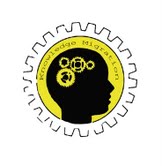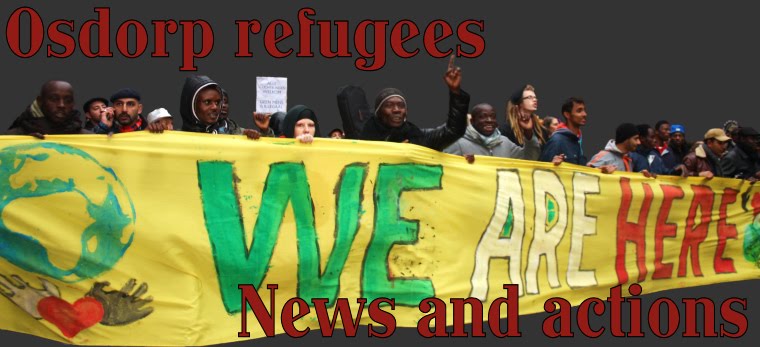http://youtu.be/nhjmdzYEwzg
Brazil’s booming economy brings many African migrants to its shores, but once there does the dream of a better life die?

http://youtu.be/nhjmdzYEwzg
Brazil’s booming economy brings many African migrants to its shores, but once there does the dream of a better life die?
Yes we camp

In Amsterdam and The Hague rejected refugees from Africa and the Middle East are enduring the harsh weather in make shift tent camps where they demonstrate against the Dutch way of treating rejected refugees since September 4th (Amsterdam) and 19th (The Hague). Since 2010 asylum seekers who have been rejected are no longer entitled to basic rights such as shelter and food. Even when it is impossible to return to their countries of origin, the Dutch government argues that they can leave voluntarily. Denying them access to reception centers, putting them in prison and forcing them to survive in parks, railway stations and insecure hiding places, that is the way to convince them to leave this country. In the first half of 2012 4.680 asylum seekers have been dumped on the street without any life support, according to the International Network of Local Initiatives with Asylum seekers (INLIA). These self-organized action by the refugees have highlighted a humanitarian problem that has been growing for years and was hidden from the public eye. Now these people have made themselves visible and seek solutions by entering in dialogue with civil society and democratic representatives. To realize their aims they need to be together, safe and visible. Apparently the authorities want to make them disappear again. The only offer is for some of the refugees to go for 30 days in dispersed shelters for homeless people. After that they would again be on their own, insecure and invisible. A growing number of supporters is trying to create sustainable ways to continue this struggle for human rights. One way would be to make a space available as a meeting point for refugees, a House of Hope.
On their blog, the refugees that camp out in Amsterdam declared:
“We are here because our life is in danger. There are many reasons for this. War is the most important one. There are several armed conflicts in Africa that cost many lives, disrupt families and livelihoods. Political violence and oppression, religious division, problems between tribes and clans add to make solutions complicated. Drought, famine and other economic factors also push people to find a better future elsewhere. All these cases are inter-related. We can see this in the extremist movements. They make life impossible for you if you do not conform to strict rules. Having a drink can cost you your life. Being a member of another tribe, or of another religion, can bring you into deep trouble. So we are here because we face persecution and danger in our countries. We need to be in the Netherlands because this country is a free country where our lives are safe and we could build a future. “
We want your help. We want to get out of this situation. We want your help, not just with food and drinks, but with the broader issues. Help us with publicity, be creative: think about how you could help. Whether you’re politically active, or a journalist, everyone can help in their own way. We have 5 representatives you can talk to, to explain our situation.
The name “Refugees-on-the-Street” was coined when they started organizing in the spring of 2011 in Utrecht, with support of the STIL Foundation, a solidarity group for migrants without a residence permit. They are people who fled their home country, asked for asylum but were denied permission. The capstone of the asylum procedure is deportation. Undocumented migrants are systematically held in administrative detention for up to 18 months and this can be repeated endlessly. If they cannot be deported they are put on the street without any title of right, no shelter no care, nothing at all. Most of them go in hiding, including women with children. They depend on charity, on good will (or bad will) of private people. But more and more refuse to hide and they fight for a decent life, for hope.
Since the big tent camp in ter Apel everybody knows they are here. Through their demonstrations and actions, by their presence in the media and in politics they have joined the public debate. In Amsterdam the Camp against the Cold started on the 4th of September where a growing number of refugees find shelter, food, safety and medical care. With their slogan “WE ARE HERE” (WIJ ZIJN HIER) they show that WE are human beings, WE have nowhere to go, WE stay here until we have a solution that respects our human rights. In the camp at Notweg 32 in Amsterdam Osdorp are mainly African men and women (children are not allowed by the Mayor of Amsterdam) from Somalia, Eritrea, Ethiopia, Sudan, Kenia, and francophone people from Congo, Mauretania, Ivory Coast, Sierra Leone, Mali and Guinee. There are individuals from Yemen (2), China and Armenia.
In Den Haag a group of Iraqi (mostly Kurdish) refugees is camping near the central Staion in open tents in worse conditions than in Amsterdam. They carry the name RIGHT TO EXIST.
Health 4 All Demonstration At Ontario Health Ministry*
By Dwight Gordon — Member of the Jane and Finch Action Against Poverty (JFAAP), Toronto.
On January 23, 2013 Health 4 All as well as some community activists and medical students spent over an hour braving the harsh weather elements to try to convince health minister Deb Matthews to commit to more accessible health care for refugees. The argument was that provinces such as Manitoba and Quebec have made health care more accessible to refugees, so why shouldn’t Ontario. Physically the demonstrators were ice cold but it was as if our hearts were warm and the determination to express the message was red hot. Word was that Deb Matthews made no commitments to demands but apparently would watch to see what Quebec and Manitoba are doing. At the protest there was talk of the federal government’s tough anti-immigration efforts and that the anti-immigration stance among some Conservative MPs was strengthening. There were also tales of refugees who badly needed health care but had a hard, if not impossible time getting it. I guess it remains to be seen how influential were the protestors who stood out in the cold for well over an hour. There was also talk of the Idle No More movement being an influence on the demonstrators.
Will the contagious momentum keep up? Hmmm. One thing I’ll say is, I’ve heard all sorts of talk like that this group of immigrants want to take over and cater to their own kind. Or that group of other immigrants are taking over this country by committing crime. Another group is supposedly just draining the countries resources and services. Are no government officials or politicians thinking like this ? These ignorant attitudes need to stop because I don’t want any race or ethnic riots here like what some are actually predicting.
Thank you, from Dwight Gordon ( * These views are the opinion of the author).
Dwight Gordon — I am a Canadian of Jamaican descent from Toronto, living in Scarborough particularly. I’m very active in the black and Jamaican communities, and I also participate in causes dealing with racialized communities, poverty, health and disabilities. As I became a teenager, I got some very eye-opening lessons of the problems in society and the world we live in. And the eye-opening lessons never did stop. Me being black of Jamaican heritage definitely indirectly contributed to those lessons. Hence, my activism. Thank you
Support Health for All!
health4all.ca
www.facebook.com/healthforalltoronto
@HealthForAllTO
Find out more about Health4All at : www.health4all.ca + Watch a video of this demonstration here
We have been called many names. Illegals. Aliens. Guest Workers. Border crossers. Undesirables. Exiles. Criminals. Non-citizens. Terrorists. Thieves. Foreigners. Invaders. Undocumented. Our voices converge on these principles:
1. We know that international connectivity is the reality that migrants have helped create, it is the place where we all reside. We understand that the quality of life of a person in a country is contingent on migrants’ work. We identify as part of the engine of change.
2. We are all tied to more than one country. The multilaterally shaped phenomenon of migration cannot be solved unilaterally, or else it generates a vulnerable reality for migrants. Implementing universal rights is essential. The right to be included belongs to everyone.
3. We have the right to move and the right to not be forced to move. We demand the same privileges as corporations and the international elite, as they have the freedom to travel and to establish themselves wherever they choose. We are all worthy of opportunity and the chance to progress. We
all have the right to a better life.
4. We believe that the only law deserving of our respect is an unprejudiced law, one that protects everyone, everywhere. No exclusions. No exceptions. We condemn the criminalization of migrant lives.
5. We affirm that being a migrant does not mean belonging to a specific social class nor carrying a particular legal status. To be a migrant means to be an explorer; it means movement, this is our shared condition. Solidarity is our wealth.
6. We acknowledge that individual people with inalienable rights are the true barometer of civilization. We identify with the victories of the abolition of slavery, the civil rights movement, the advancement of women’s rights, and the rising achievements of the LGBTQ community. It is our urgent responsibility and our historical duty to make the rights of migrants the next triumph in the quest for human dignity. It is inevitable that the poor treatment of migrants today will be our dishonor tomorrow.
7. We assert the value of the human experience and the intellectual capacity that migrants bring with them as greatly as any labor they provide. We call for the respect of the cultural, social, technical, and political knowledge that migrants command.
8. We are convinced that the functionality of international borders should be re-imagined in the service of humanity.
9. We understand the need to revive the concept of the commons, of the earth as a space that everyone has the right to access and enjoy.
10. We witness how fear creates boundaries, how boundaries create hate and how hate only serves the oppressors. We understand that migrants and non-migrants are interconnected. When the rights of migrants are denied the rights of citizens are at risk.
Dignity has no nationality.
Immigrant Movement International
November 2011